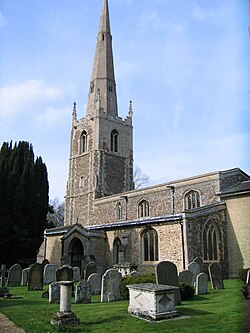Hemingford Abbots
| Hemingford Abbots | |
| Huntingdonshire | |
|---|---|
 St Margaret's | |
| Location | |
| Grid reference: | TL2970 |
| Location: | 52°19’1"N, 0°6’0"W |
| Data | |
| Population: | 584 (2001) |
| Post town: | Huntingdon |
| Postcode: | PE28 |
| Dialling code: | 01480 |
| Local Government | |
| Council: | Huntingdonshire |
| Parliamentary constituency: |
Huntingdon |
Hemingford Abbots is a village in Huntingdonshire, on the south bank of the River Great Ouse. A small, picturesque and historic village, Hemingford Abbots is the more westerly of the two much favoured Hemingford villages which flank the south bank of the Great Ouse.
Delightful rural walks through the watermeadows link the village with Houghton, Hemingford Grey, St Ives (across the river) and the Ouse Valley Way. In the centre of the village is the mediæval church with a fine spire, the pretty thatched 17th Century pub.
Its larger neighbouring village, Hemingford Grey, is just half mile to the east and the cottages of each reach out and meet on the lane.
Name of the village
The name Hemingford means "Hemma's clan's ford", in which Hemma is believed to be the name of an early English chief.[1] The name "Abbots" was added in reference to its ownership by Ramsey Abbey.[2]
Hemingford Abbots is listed as in the Domesday Book as Emingeforde. Later records call it Hemmingeford Magna, and Emmingeforde Abbatis in the 13th century.[3]
History
There has been a settlement on the present site since at least Roman times; a Roman sarcophagus has been found in the area. In Anglo-Saxon times the neighbouring villages of Hemingford Grey and Hemingford Abbots were a single estate, split in the 9th century they split. In 974 the manor of Hemingford Abbots fell under the ownership of Ramsey Abbey, whence the village's name. Ramsey Abbey held the manor until the Dissolution of the Monasteries in 1539.[2]
In 1250 the village was listed as having 96 holdings, but numbers fell following the Black Death. The population grew from 306 in 1801 to 564 in 1841, but dropped as many moved to towns and cities. It grew rapidly after the Second World War, reaching a peak of 628 in 1961. Its 2001 population was 584.[2]
The village is home to a number of mediæval buildings; Abbots End, the Manor House, Whiteways, Medlands, Abbots Barn, the White Cottage and Rideaway Cottage were all built prior to 1600.[4]
St Margaret's Church
A church is listed in the Domesday entry of 1086, although nothing remains of the building. The church was completely rebuilt at the end of the 13th century, the tower was added in the late 14th century and the spire in the 15th century. The present church is largely a result of the reconstruction in the 18th and 19th centuries.[5]
The church was originally named "St Margaret Church of the Virgin" and is now dedicated to Saint Margaret of Antioch.
Village life
The village has one public house, The Axe and Compass, situated in a thatched 15th-century house.[2] There is also a primary school and a village store.
Outside links
| ("Wikimedia Commons" has material about Hemingford Abbots) |
References
- ↑ "Village History". hemingfordgrey.org.uk. http://www.hemingfordgrey.org.uk/index.php?page=14.
- ↑ Jump up to: 2.0 2.1 2.2 2.3 "Village History". hemingfordabbots.org.uk. http://www.hemingfordabbots.org.uk/index.php?_p_=1.
- ↑ "Parishes: Hemingford Abbots, A History of the County of Huntingdon". Victoria County History. 1932. pp. 304–309. http://www.british-history.ac.uk/report.aspx?compid=42504.
- ↑ Village notice board, Hemingford Abbots
- ↑ "Hemingford Abbots". genuki. http://www.genuki.org.uk/big/eng/HUN/HemingfordAbbots/index.html.